
The Byrds were an American rock band formed in Los Angeles, California, in 1964. The band underwent multiple lineup changes throughout its existence, with frontman Roger McGuinn remaining the sole consistent member. Although their time as one of the most popular groups in the world only lasted for a short period in the mid-1960s, the Byrds are today considered by critics to be among the most influential rock acts of their era. Their signature blend of clear harmony singing and McGuinn's jangly twelve-string Rickenbacker guitar was "absorbed into the vocabulary of rock" and has continued to be influential.
Folk rock is a hybrid music genre combining elements of folk music and rock music, which arose in the United States, Canada, and the United Kingdom in the mid-1960s. In the U.S., folk rock emerged from the folk music revival and the influence that the Beatles and other British Invasion bands had on members of that movement. Performers such as Bob Dylan and the Byrds—several of whose members had earlier played in folk ensembles—attempted to blend the sounds of rock with their pre-existing folk repertoire, adopting the use of electric instrumentation and drums in a way previously discouraged in the U.S. folk community. The term "folk rock" was initially used in the U.S. music press in June 1965 to describe the Byrds' music.
"Mr. Tambourine Man" is a song written by Bob Dylan, released as the first track of the acoustic side of his March 1965 album Bringing It All Back Home. The song's popularity led to Dylan recording it live many times, and it has been included in multiple compilation albums. It has been translated into other languages, and has been used or referenced in television shows, films, and books.

"It Ain't Me Babe" is a song by Bob Dylan that originally appeared on his fourth album Another Side of Bob Dylan, which was released in 1964 by Columbia Records. According to music critic Oliver Trager, this song, along with others on the album, marked a departure for Dylan as he began to explore the possibilities of language and deeper levels of the human experience. Within a year of its release, the song was picked up as a single by folk rock act the Turtles and country artist Johnny Cash.
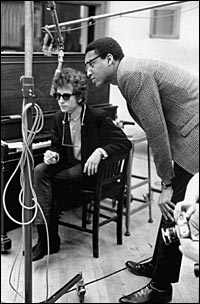
Thomas Blanchard Wilson Jr. was an American record producer best known for his work in the 1960s with Bob Dylan, the Mothers of Invention, Simon & Garfunkel, the Velvet Underground, Cecil Taylor, Sun Ra, Eddie Harris, Nico, Eric Burdon and the Animals, the Blues Project, the Clancy Brothers and Tommy Makem, and others.
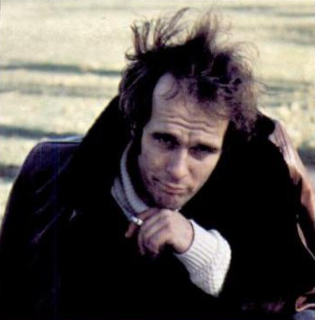
James Timothy Hardin was an American folk and blues musician and composer. As well releasing his own material, several of his songs, including "If I Were a Carpenter", became hits for other artists.

"I Am a Rock" is a song written by Paul Simon. It was first performed by Simon alone as the opening track on his album The Paul Simon Songbook which he originally recorded and released in August 1965, only in the United Kingdom. Paul Simon and Art Garfunkel, as the American folk rock duo Simon and Garfunkel, re-recorded it on December 14, 1965, and included as the final track on their album Sounds of Silence, which they released on January 17, 1966. It was released as a single in 1966, and subsequently included as the B-side of the 1971 A-side reissue of "The 59th Street Bridge Song ".
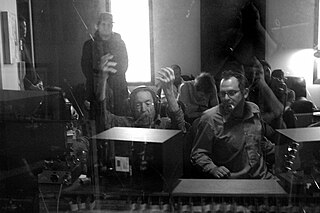
Donald William 'Bob' Johnston was an American record producer, best known for his work with Bob Dylan, Johnny Cash, Leonard Cohen, and Simon & Garfunkel.

"The Times They Are a-Changin'" is a song written by Bob Dylan and released as the title track of his 1964 album of the same name. Dylan wrote the song as a deliberate attempt to create an anthem of change for the time, influenced by Irish and Scottish ballads. Released as a 45-rpm single in Britain in 1965, it reached number 9 on the UK Singles Chart. The song was not released as a single in the U.S.

Odetta Sings Dylan is an album by American folk singer Odetta, issued by RCA Victor in 1965. It consists of covers of Bob Dylan songs.
"One Too Many Mornings" is a song by Bob Dylan, released on his third studio album The Times They Are a-Changin' in 1964. The chords and vocal melody are in some places very similar to the song "The Times They Are A-Changin'". "One Too Many Mornings" is in the key of C Major and is fingerpicked.
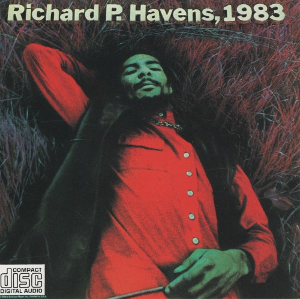
Richard P. Havens, 1983 is a 1968 double album set by folk rock musician Richie Havens featuring a combination of studio recordings and live material recorded in concert during July 1968. The album combined original material with several of the covers for which Havens is known. Notable songs include the singles "Stop Pushing and Pulling Me" and "Indian Rope Man", the latter of which has been multiply covered under its own name and in retooled identity as "African Herbsman." The genre-bending album was critically and commercially well-received, reaching #80 on the Billboard "Pop Albums" chart. Initially released on the Verve label, it has been reissued multiple times in various formats, including by Verve subsidiary Verver Forecast/PolyGram and Australian label Raven Records. It has also been compiled with albums Mixed Bag and Something Else Again in multi-cd set Flyin' Bird: The Verve Forecast Years on the Hip-O Select/Universal label.

Bull Durham Sacks & Railroad Tracks is an album by American folk musician Ramblin' Jack Elliott, released in 1970. It was his second, and last, release on the Reprise label. Elliott did not release another studio album for eleven years.
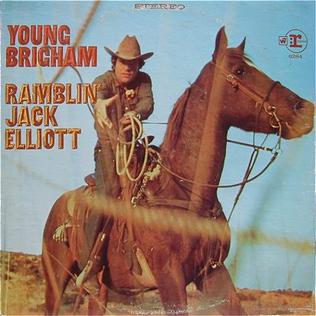
Young Brigham is an album by American folk musician Ramblin' Jack Elliott, released in 1968.
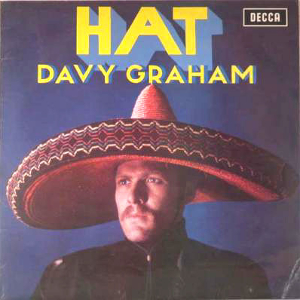
Hat is an album by British musician Davy Graham, released in 1969.

The Byrds' Greatest Hits Volume II is the second greatest hits album by the American rock band the Byrds. It was released in the United Kingdom and Europe on October 29, 1971 by CBS Records as a follow-up to the band's first compilation album, The Byrds' Greatest Hits. The album appeared following the band's successful appearance at the Lincoln Folk Festival in England on July 24, 1971 and according to band biographer Johnny Rogan may have been issued by CBS as a reaction to the band's previous studio album, Byrdmaniax, having failed to chart in the UK.
"The Folk Singer" is a folk song, written by Charles E. Daniels and American musician Johnny Cash and first recorded by Cash in 1968. It is also known as "Folk Singer" or, less often, "The Singer".
"Farewell", also known as "Fare Thee Well", is a song by American singer-songwriter Bob Dylan. Dylan wrote the song in January 1963. He considered it for his third album, The Times They Are a-Changin', but only attempted a few takes during the album's first studio session. Dylan's earlier recordings of "Farewell" found their way onto various bootlegs, and a collection of demos that included the song was released in October 2010 on The Bootleg Series Vol. 9 – The Witmark Demos: 1962–1964.
Nashville Airplane is the 27th album by Lester Flatt and Earl Scruggs released in 1968 on the Columbia Limited Edition label. It was recorded shortly before their breakup in 1969. Lester Flatt resisted the change in direction to a point that led to the breakup.













